BOSSIER PARISH, La. — After more than a decade living out of state, Jennifer Russell and her husband decided it was time to return home to northwest Louisiana. The couple, both in their early thirties at the time, wanted their two children to get to know their grandparents and to benefit from good public schools. In early 2015, lured by inexpensive rental housing on the Air Force base in the area, the family moved to a town in Bossier Parish, across the Red River from Shreveport, where they’d both grown up. Russell’s daughter started kindergarten that fall; her one-year-old son began day care. At first, her daughter adjusted well to the move and made friends. “It was what every parent wants,” Russell told me.

She had no inkling that her family’s religious identity would prove to be a complication. Russell and her husband both grew up Southern Baptist, a conservative, evangelical Protestant denomination that dominates this area of the Bible Belt. They went to the same church, in fact, and had met because their parents became friends. But she’d abandoned the Baptist church as a young adult, after studying world religions in college and starting to doubt what her faith promoted. Following graduate school and during her first years working as a psychologist, her skepticism grew. It seemed to her, she told me, that believers felt they had a “monopoly on truth, that their way was the only way.” Her husband, too, wanted a more progressive form of Christianity. After moving from Wichita Falls, Texas, the family joined a Unitarian church in Shreveport, a progressive house of worship with Christian roots that incorporates the traditions of many religions.
The first signs of trouble began a few years after the family’s move. Russell’s daughter, who did not want her name used to maintain her privacy, came home from school one day with the report that some boys on the school bus had interrogated her and other children about their religion. They asked each student, “Are you a believer in God?” The girl, who liked attending her Unitarian church but did not believe in God, recalled that she told her questioners, “‘No.’ And they said, ‘You’re going to hell.’”
“It was all flatly unconstitutional.”
Richard Katskee, the former legal director of Americans United for Separation of Church and State, who represented the plaintiffs in their lawsuit against Bossier Parish schools
Russell was dismayed, but she wanted her daughter to respect others’ views. She told her, “There are kids who believe that…. You want to be respectful, but it doesn’t mean he’s necessarily right, either.” Russell and her husband, who did not want to be interviewed for fear of backlash in the workplace, advised their daughter that if someone started talking to her about her faith, to change the subject, put on headphones, or read.
Russell felt it was harder to ignore teachers. In fourth grade, at least twice a week, the girl’s teacher said a prayer aloud in class. Following their teacher’s lead, some children clasped their hands and bowed their heads. “It was a lot about Jesus and God and help us through the day and stuff like that,” said Russell’s daughter, who sat in the back of the class and tried to tune it out.
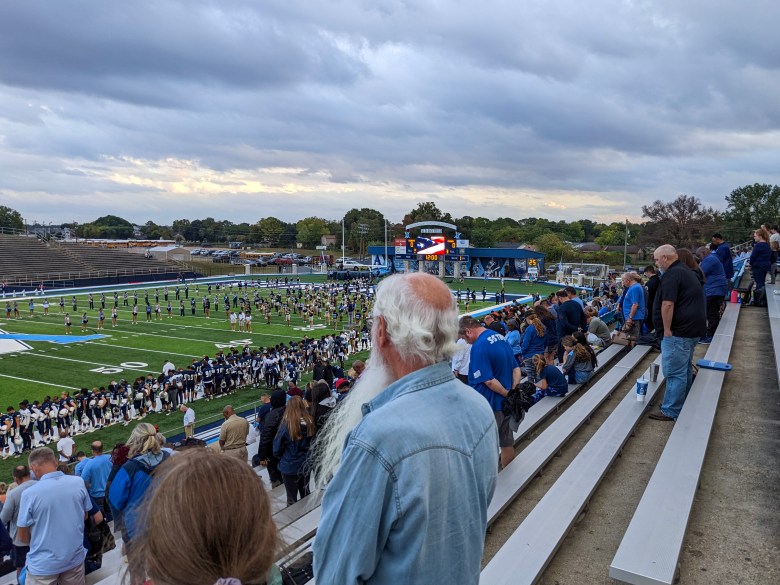
Related: How the federal government abandoned the Brown v. Board of Education decision
Increasingly incensed, Russell felt her daughter’s experiences were symptomatic of the school system’s extensive promotion of evangelical Christianity, also evident in routine prayers at school board meetings, graduations and sporting events. “Teachers, administrators, other staff of the schools — they set the temperature in terms of what was accepted,” she told me. Worried that her daughter would become more of a target for her peers, however, she did not complain directly to Bossier Parish schools. Instead, Russell and her husband began to contemplate moving away.
Other families, however, did complain. In 2018, four parents from three families, listed as Does 1–4, sued Bossier Parish schools for promoting religion and coercing students to participate in prayer. They argued that the prayer was a violation of the First Amendment’s establishment clause, which calls for a separation of church and state. The lawsuit listed more than 100 church/state violations, including teacher-led prayer in classrooms, prayer at sporting events and faculty- and administrator-led prayer at graduations. “It was all flatly unconstitutional,” said Richard Katskee, the former legal director of Americans United for Separation of Church and State, who represented the Bossier Parish plaintiffs.
“I want the Supreme Court of the United States to rule very similar to how they ruled in the recent coach deal, that those coaches, teachers, or educators, or anyone in the school do have a right to pray and to talk about God.”
Rex Moncrief, co-host, Bossier Watch, a Youtube program primarily about local news
The school system acknowledged most of the incidents, but denied that all of the schools’ actions were unlawful. The following year, a federal court in Louisiana sided with the plaintiffs, and ordered the nearly-23,000-student school district to stop promoting religion.
As Bossier Parish school district was ordered to change, however, the legal landscape was changing, too. A different lawsuit was winding its way through the courts, backed by organizations that had long supported school prayer, over the right of a high school football coach to pray on the field after games. Last June, the Supreme Court ruled 6–3 in favor of the coach, Joe Kennedy, who sued the Bremerton, Washington, school district after it disciplined him when he refused to end the practice of praying at the 50-yard line following games. The majority opinion in Kennedy v. Bremerton stated that the coach had a right to freely exercise his religion because he was praying outside his coaching duties. The decision described Kennedy’s prayer as a quiet, personal act. But Justice Sonia Sotomayor, in a dissent, noted that for years the coach had led students in locker-room prayers. Often, students from both teams joined him on the field in his prayers. Katskee, who represented the Bremerton school district, told me that students who declined to participate “got harassed and harangued.”
In Bossier Parish schools, parents, teachers, and students told me, the court order stalled, but didn’t entirely stop, Christian prayer. Now, with a Supreme Court friendly to school prayer, educators and state lawmakers around the country are testing the limits of the strict separation of church and state written into the Constitution. In a handful of states, including Kentucky, Montana and Texas, lawmakers have recently proposed or passed measures attempting to promote faith in schools. In Kentucky, for example, the legislature passed a law in March that would allow teachers to share their religious beliefs in school. A Kentucky lawmaker who sponsored the House bill told local television station Lex 18 that he hoped the measure would “embolden these Christian teachers” who may have been afraid to express themselves in public schools.
Meanwhile, attorneys from organizations that often handle complaints about school prayer told me they are receiving word that the Kennedy ruling is leading to more open proselytizing by teachers. In some states, one attorney said, teachers have set up prayer clubs for students and delivered sermons in class. In at least one case, a school district cited the Kennedy ruling as the reason for prayer at school board meetings.
The Christian conservatives advocating for more religion in the schools are doing so in the name of religious freedom. The way they define that freedom could lead to prayer becoming commonplace at public schools all over the country. Over time, advocates of the separation of church and state fear, long-standing protections for young atheists, people who belong to no religion and religious minorities will be eroded — until, perhaps, these protections disappear altogether. As Christianity is held up as the only acceptable way to believe and to live, non-Christian children, who may already feel different, could find themselves all the more sidelined, ostracized or bullied. “This isn’t a legal fight to some of these people,” Jeb Baugh, one of the Bossier parents who sued, told me. “This is a religious war. This is a fight for the heart and soul of the country.”
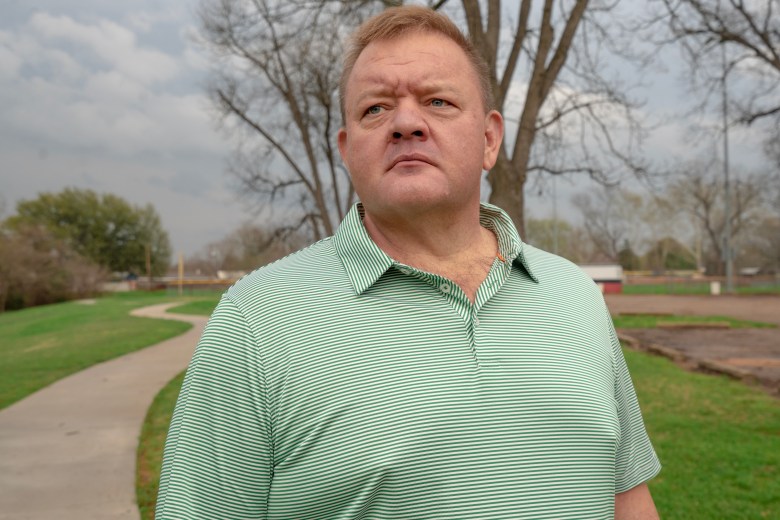
The United States has a long history of fights about what place, if any, religion should have in its public schools. The First Amendment prohibited Congress from establishing a religion or denying people the free exercise of their religion. Nevertheless, when public schools as we know them today began to open in the United States in the 1840s, students often learned from readers that used Protestant Scripture, and Bible readings and Protestant prayer were commonplace, said James Fraser, a professor of history and education at New York University. Roman Catholic leaders in Boston encouraged students to resist, and street fights broke out over the issue. Protestants argued that Catholics were trying to ban Bibles from school; Catholics wanted the right to use their own. By the start of the 1890s, after similar clashes in other cities, many states had passed laws specifically prohibiting school prayer.
Conflicts continued into the twentieth century, when the U.S. Supreme Court decided to take up cases on religion and public schools. In 1948, in response to an atheist mother’s complaint on behalf of her child, the nation’s highest court, in an 8–1 vote, banned outside religious instruction on school property during school hours, citing the First Amendment’s separation of church and state. In two landmark cases in the early 1960s, the court ruled against mandatory prayer and Bible readings in schools. Between 1962 and last year, the court ruled at least three more times against allowing school prayer: at graduations, football games and as part of moments of silence.
But in Bossier Parish, 60 years of Supreme Court rulings went largely ignored. The area has many contradictions. Baptist churches crowd a landscape dotted with casinos. In Bossier City, remnants of the Bossier Strip persist; gambling and prostitution flourished there during the 1960s. A nearly 200-foot cross rises in nearby Haughton, JESUS SAVES signs cover buses, and a billboard proclaims, SHAKEN BY LUST? JESUS SETS YOU FREE. The gold dome of Bossier City’s sole mosque is visible just beyond the restaurants and bars of the popular East Bank District, but other signs of religious minorities in the area are scant. Bossier Parish has nearly 130,000 residents, and the houses of worship serving minority faiths are small, with no more than 100 to 300 members or families each.
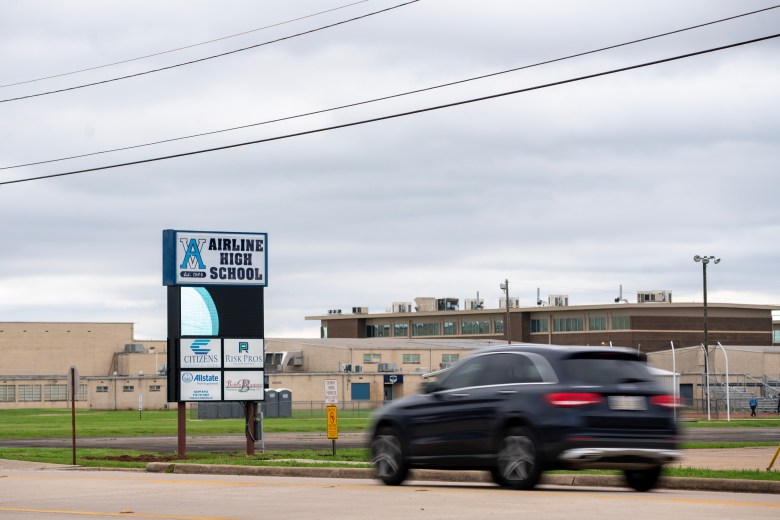
Before the court order, some Bossier teachers often led children in a prayer to start the day, according to the lawsuit. Airline High, one of the district’s seven high schools, was cited for putting “prayer boxes” — into which students could deposit prayer requests — around the building. Some teachers taught lessons on Creationism. Kindergarten students at one school were required to memorize and recite a prayer before lunch. Bossier Parish also had an official prayer policy, set by the school board, that allowed students and teachers to observe silent prayer or meditation during the school day. The families who participated in the lawsuit against Bossier Parish schools didn’t want to sue, Katskee told me. But despite numerous letters and complaints his group sent on their behalf to the school district, Bossier schools refused to stop.
In late 2017, as the lawsuit was imminent, the superintendent at the time, Scott Smith, defended prayer at football games on a local radio station. Asked by the radio host if the school district would stop prayer over loudspeakers at football games because it violated a 2000 Supreme Court ruling, Smith said it would not. “There are creative ways that we can break out in spontaneous prayer,” he said, foreshadowing his district’s response to the court order, “and still follow the law.” (In its response to the lawsuit, the district denied any wrongdoing by Smith or other employees.)
Statements like that one angered some of the plaintiffs and reinforced their belief that district leaders did not care about the effect on their children. One plaintiff, who agreed to be interviewed only if she could remain anonymous, told me that all four of her children complained to her about a teacher or other school official leading prayer or forcing religion on them in some way. She and her husband are of different faiths. (To keep anonymity, she asked that I not reveal their religions.)
Related: In the wake of ‘Don’t Say Gay,’ LGBTQ students won’t be silenced
When her youngest son came home from elementary school with a prayer to Jesus in his folder and instructions to memorize it, she complained to his teacher, but the practice continued. “His teacher told him he was going to hell if he wasn’t a Christian,” she remembered. “He had nightmares.” At first, she was fearful about joining the suit because she did not want her children to suffer more. “Kids were like, ‘If you don’t love Jesus, you can’t be my friend,’ ” she said.
“I didn’t feel like I had any allies. They are getting away with it. People are scared to speak up because of retaliation.”
Jennifer Russell, mother and former parent of a Bossier Parish school student, on the culture of fear among those who don’t support school prayer
Jeb Baugh, another plaintiff, and his son, Hayden, agreed to speak with me on the record because Hayden is 19 and no longer in the school system. Baugh, a software engineer who grew up Southern Baptist, describes himself now as atheist. He prides himself on falling outside of the mainstream in his conservative area. When we met, he wore a t-shirt that poked fun at conservatives’ “don’t tread on me” slogan. It read: “no one’s treading on you, sweetie.” Over Zoom from a college dorm room, Hayden, a freshman studying mechanical engineering, told me that he remembered seeing crosses and Bible verses on the wall in one of his middle school teacher’s classrooms. She wasn’t the only one promoting Christianity. “There were teachers who did pray [in the classroom], leading [it] with the children,” Hayden, who identifies with no religion, told me. “I was always like, ‘I don’t want to do this.’”
At Parkway High School, Hayden was a member of the fishing team. His coach led the team in prayer before tournaments, Hayden told me, and he went along with it. “I bowed my head. I didn’t want to stand out really. I just wanted to fish,” said Hayden, who described himself as a “go with the flow” kind of person. He chose to speak up now, he explained, because he was concerned about the effect of so much religiosity on children. “Every kid has a right to feel comfortable and safe in their environment,” he told me.
“To the people who take offense, they don’t have to participate.”
Duke Lowrie, co-host, Bossier Watch, a Youtube program primarily about local news
After the suit was filed, community reaction was swift. Many residents and some prominent area politicians, including U.S. Representative Mike Johnson of Bossier City, argued that the lawsuit might usurp the rights of Christian students who, they insisted, are entitled to the free exercise of their religion even in school. In March 2018, hundreds of students from Bossier Parish and a neighboring school system, which had also been sued for similar issues the previous year, attended a meeting of a new “Protect Prayer” group to protest an attack on their religious freedom, the local TV station KSLA reported at the time. A month later, according to the Bossier Press-Tribune, hundreds rallied at Bossier Parish Community College to stand “up for student rights to live out their faith no matter the school or city.” Johnson and Jeff Landry, Louisiana’s attorney general, teamed up for a publication encouraging students to freely practice their religion in schools.
Russell, even as she worried about her daughter’s complaints, avoided the topic with other parents. “I didn’t feel like I had any allies,” she explained. She also had no hope that the school system and its teachers would do anything to stop religious harassment or proselytizing. “I don’t see why they have any reason to,” she explained. “They are getting away with it. People are scared to speak up because of retaliation.” In 2022, after finally saving enough money to buy a home, Russell and her husband decided to move to Shreveport, where they enrolled their children in another school system.
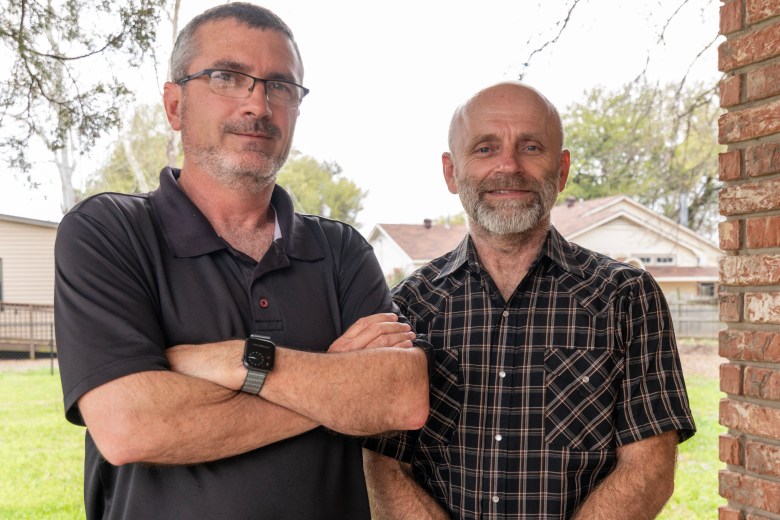
Longtime Bossier residents Rex Moncrief and Duke Lowrie, the co-hosts of Bossier Watch, a YouTube show primarily about local politics, sided with school prayer advocates. I met with the pair, who describe themselves as amateur citizen journalists, in Lowrie’s mortgage company office. They talked while sipping coffee from Bossier Watch mugs. “I can recite the Lord’s Prayer right now to you because I did it in every wrestling practice Monday to Friday unless we had a match that day,” said Lowrie, a retired firefighter with two kids.
Neither Moncrief nor Lowrie, both 52, saw why prayer at school events might pose a problem. Moncrief, who runs his own computer business, grew up in Ruston, Louisiana, about an hour’s drive from Bossier City, and said he prayed in school as a kid. “I didn’t feel any coercion, like there was an armed guard standing there forcing me,” Moncrief said. His three sons, who attended home school and Bossier Parish schools, are in their twenties. “To the people who take offense, they don’t have to participate,” Lowrie agreed.
Moncrief said he wished the school system had been able to fight the lawsuit all the way to the U.S. Supreme Court. “I want the Supreme Court of the United States to rule very similar to how they ruled in the recent coach deal, that those coaches, teachers, or educators, or anyone in the school do have a right to pray and to talk about God,” he told me.
The Bossier Parish case, however, ended with the Louisiana federal court judge’s decision and a consent decree both sides signed off on. Under the 2019 order, “School Officials are permanently enjoined from promoting, advancing, endorsing, participating, or causing prayers during or in conjunction with School Events for any school.” The decision mandated specific remedies: At the start of each school year, teachers must watch a roughly 14-minute training video about the dos and don’ts regarding religious expression. Jointly created by Katskee, who represented the parents, and Jon Guice, the Bossier Parish school board attorney, the video notes that invocations at sporting events and graduations are impermissible, and that school employees are prohibited from participating in prayer with students at any school event or during instruction.
School district officials referred my requests for comment to Guice. “Bossier implemented the court order,” he told me. “And we’ve had no parental complaints since then. None. Zero.” In an email, the district’s public relations liaison wrote that it was “important to note” that neither the current superintendent, Mitch Downey, nor the school board president were in their present positions when the lawsuit was filed. Downey became superintendent in April 2019, not long after the federal order was issued, and has spent his entire 37-year career in the school system.
My visit to Bossier painted a fuzzier picture. Some teachers still display crosses in classrooms, two residents told me, and prayer has remained a ritual at school board meetings and at least one graduation. School board agendas begin with a “Prayer & Pledge of Allegiance.” At each meeting, the superintendent reads off names of people in need of prayer, and a different board member leads a prayer. At least one board member ended with, “In Jesus’s name, amen.” Prayer has remained a staple at several high schools’ football games.
“A lot of times in a school district of any size, the principal and the administration are unaware that something occurs unless someone says anything,” Guice told me. “If a principal sees a violation, the violation is addressed.”
Related: Teachers, deputized to fight the culture wars, are often reluctant to serve
On a Friday in early November, I attended a football game at Airline High. As a cloudy sky threatened a downpour, the marching band played the school’s fight song, cheerleaders shook pom-poms, and a dance line sashayed. The Airline Vikings ran onto the field to the clanging of cowbells, and the game announcer, in an enclosed booth, welcomed all, drawing his last words out with a flourish: “It’s time tonight for Viking football at a chance for the district title.” Then, Airline’s senior class president took the mic to ask the crowd to join her in prayer.
For the next few minutes, the school football stadium resembled a church service. Most everyone in the bleachers, and those on the field, stood and bowed their heads. “Dear heavenly Father, thank you so much for the opportunity for us to be here tonight,” the student said.
“Tonight, I pray that you keep everyone here safe, and that the teams on both sides of the field will have good sportsmanship. Lord, most of all, I pray that everything done tonight will honor and glorify you.” Guice told me that prayers like this one are permissible because they are student-led, and speakers are chosen in a neutral way.
Among the court rulings to touch on issues like these was a 2001 federal appeals court decision upholding a Florida school district’s right to allow student speakers to lead audiences in prayer at graduations if those speakers were chosen based on “content-neutral, evenhanded criteria” and the school district didn’t intervene with the message. The ruling applied to some Southern states, but not Louisiana. The Supreme Court declined to weigh in, leaving it unclear what is legal for school districts like Bossier that are outside of the lower court’s jurisdiction.
Charles C. Haynes, a First Amendment expert and a senior fellow for religious liberty at Freedom Forum’s Religious Freedom Center, told me that he thought Bossier Parish schools may essentially be telling students they can “say whatever you want, ‘Wink, wink.’ ”
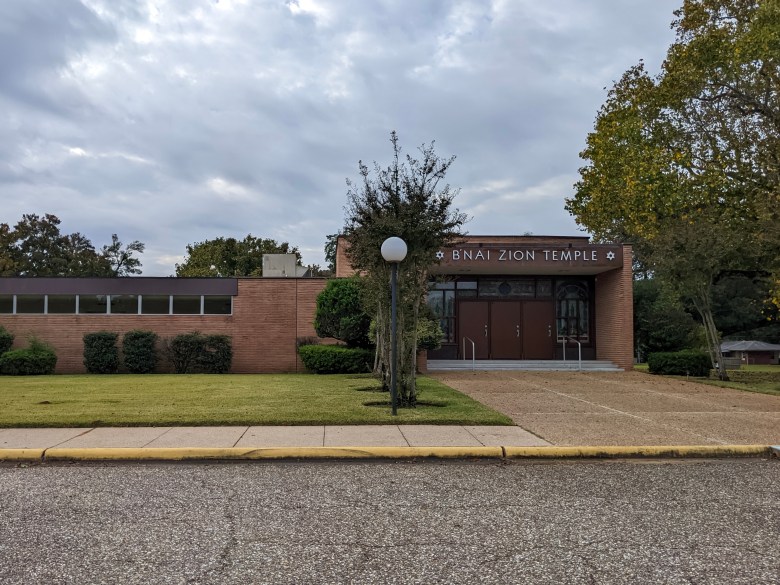
During the 1960s, as the Supreme Court ruled against school-sponsored prayer, a countervailing “return God to schools” movement began to grow. At first, that movement made minimal progress, given a liberal Supreme Court unlikely to change past rulings. In the 1970s, the first leaders of the movement, including Jesse Helms, a North Carolina U.S. senator, failed at several attempts to pass legislation allowing prayer in schools. But from the 1980s until today, especially during the presidencies of Ronald Reagan and Donald Trump, who each relied on conservative evangelicals for political support, the movement steadily picked up steam. Today, its supporters see school prayer as a way to “impose conservative Christianity on a captive school audience,” said Andrew Seidel, vice president of strategic communications for Americans United for Separation of Church and State, the organization that represented Bremerton schools against Kennedy.
By the 1990s, Pat Robertson, the televangelist, had become a key leader of the movement. He used an organization he founded, the American Center for Law and Justice, to promote prayer led and organized by students at graduations as an alternative to the clergy-led prayer the Supreme Court had banned. Around the same period, religious conservatives created a number of legal firms to fight for their aims, including First Liberty Institute, whose attorneys represented Kennedy in the recent Supreme Court case.
The Kennedy ruling was a huge victory for the movement, which has focused its strategy in recent years on elevating conservative Christian judges, Seidel told me. “The other side is emboldened, and the other side is not individuals,” he said. “It is a group of well-funded Christian nationalist legal outfits looking for these cases and seizing upon them so they can take them to court.” (First Liberty, like some other Christian legal groups, rejects the “Christian nationalist” label, with executive general counsel Hiram Sasser calling it “ridiculous,” and adding, “We represent Muslims, Jewish groups, the Falun Gong, and a Native American sweat lodge.”)
Groups that filed amicus briefs in the Kennedy case included not only legal organizations, but also conservative religious groups such as the Ethics and Religious Liberty Commission of the Southern Baptist Convention and the Billy Graham Evangelistic Association; state attorneys general, including Louisiana’s Landry; U.S. senators, including Ted Cruz; and congressmen. Landry, in defending Bossier Parish in a 2018 KEEL radio interview, gave the common mantra of the movement: “It’s time for people of faith to recognize that the First Amendment protects them as well, and their faith doesn’t stop at the schoolhouse door.”
Related: A charter school faces the ugly history of school choice in the Deep South
Attorneys from First Liberty and Liberty Counsel, another prominent conservative legal organization, told me the door has opened to bring prayer back to schools across the nation, at least when it comes to school-sponsored events. Their first test of the Kennedy ruling’s impact may be a case now before a federal appeals court. That case deals with prayer broadcast over a loudspeaker at a Florida high school football championship event. The school that sued to allow the prayer, Cambridge Christian School of Tampa, is private and religious, and was playing another private religious school, but the championship was a public one, sponsored by the state athletic association. The ruling in the Kennedy case strengthens Cambridge Christian’s case arguing for prayer at school events, said Keisha Russell, an attorney at First Liberty, which is representing Cambridge Christian. In her view, the Kennedy ruling made it clear that prayer on school property is not necessarily government speech.
“The other side is emboldened, and the other side is not individuals. It is a group of well-funded Christian nationalist legal outfits looking for these cases and seizing upon them so they can take them to court.”
Keisha Russell and Mathew Staver, founder of Liberty Counsel, told me their firms are looking for fresh opportunities to bring cases. In the Kennedy ruling, they noted, the Supreme Court overruled the so-called Lemon test, a three-pronged standard set out in a 1971 ruling that delineated criteria the government must meet in order to comply with the clause defining the separation of church and state. One prong states that the government can assist religion only if there is no “excessive entanglement” between church and state. Justices later generally interpreted this to mean that a public entity cannot endorse religion.
Liberty Counsel’s lawyers recently analyzed court rulings since 1971 and found at least 7,000 citations of the Lemon test. Staver said all of those cases must be reexamined. His firm hopes to reverse the 1992 ruling Lee v. Weisman, for example, which prohibited clergy-led prayer at public school graduations partly on the grounds that the graduates in attendance were coerced to participate because they had to be at the event. Staver said that argument no longer holds. “I think un-comfortability is not unconstitutionality,” Staver told me.
For his firm, the Kennedy ruling is a gold mine, he said. “It’s a win for everybody. It does not give anyone a trump card to censor religion or religious viewpoints.”
In such an environment, Bossier Parish could represent a harbinger of what is to come. It may become much tougher for parents who don’t support school prayer to keep religious promotion out of public schooling, Haynes told me. “The people determined to restore prayer to schools are very good at finding a way.”
Defenders of a separation between church and state say the pro-prayer movement’s version of religious liberty ignores the harm that public school prayer does to others. Holly Hollman, the general counsel of the Baptist Joint Committee on Religious Liberty, an organization of attorneys, ministers and scholars who defend religious freedom for all, including the nonreligious, told me: “Prayer is not going to be inclusive, even if it’s the broadest prayer.”
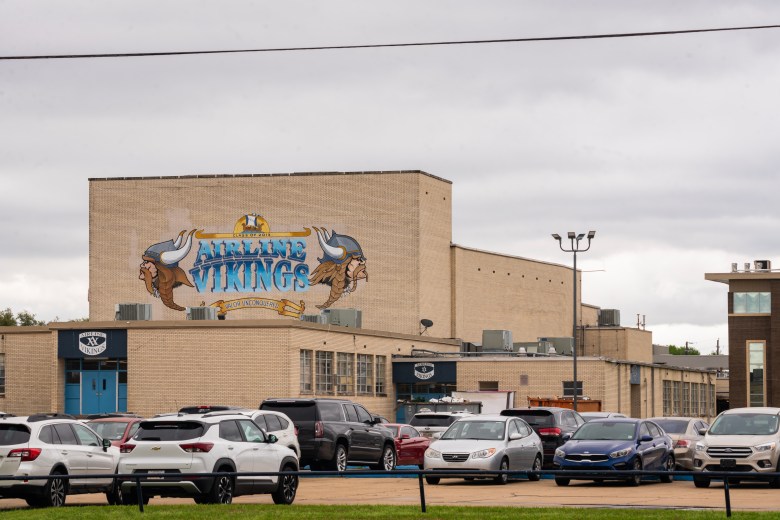
Ashleigh Joyner, a 2005 alumna of Airline and the parent of a sophomore, agreed. Dressed in blue jeans, a flannel shirt, and a baseball hat, Joyner stayed seated when the student delivered the prayer at Airline that Friday evening. Joyner was raised Southern Baptist and now identifies as nonreligious. She watched the game with a group of other Airline moms near the 50-yard line and told me later that she sensed the stares of people behind her when she did not rise to pray. The prayers’ effect on religious minorities particularly worried her. “I don’t want someone to come to a school event and feel uncomfortable,” she said.
Prayers at football games in Louisiana schools are not uncommon, she said. Bossier just “got caught.” It irked her that the school system hadn’t changed more dramatically, even after the court order. “It seems like they said, ‘Well, we’ll sweep it under the rug because enough people don’t care.’ Nobody complains because who’s going to listen?”
It’s hard to fight tradition in the Bible Belt, Jeb Baugh told me. “This is what they do. Friday night lights, faith, family, football.” At Parkway High, students lead prayers at each game, said a student who attends there. I met the teen, who did not want her name used, at the Bossier City Farmer’s Market, held on Saturdays in a mall parking lot. Nearby, a bearded man in a folding chair strummed his guitar, playing praise music and folk songs. The vendors sold arts and crafts and local delicacies, including gator meat.
The student’s mother, Beth Graham, standing nearby, said the Parkway football game announcer gives a disclaimer over the loudspeaker before the prayer, clarifying “that the thoughts, opinions, and words expressed by the student do not express the views of the school. The student is speaking of their own free will.” The prayer, her daughter said, helps the athletes. “I know a lot of people depend on their faith to do good in games,” the teen said.
Because she grew up in the area, Jennifer Russell isn’t surprised by arguments like these. In nearby Caddo Parish, her own second-grade teacher led the class in a prayer every day before lunchtime. “It didn’t seem weird to me,” she reflected. “Looking back, I see that differently. If a child wants to pray over their lunch, they can do that. It should not be led by the teacher.”
As she explained why she was willing to go public with her family’s story, Russell’s voice cracked, and tears gathered in her eyes. Her daughter patted her arm to comfort her. “We have lots of points of privilege in our family,” she said. “We’re white. We’re not a majority religion, but we’re not one that has faced as much persecution as some others, like Jews, people of the Islamic faith.”
After speaking with Russell and her daughter, I drove to the parish’s mosque, Masjid Alnoor, on a street just beyond Bossier City’s East Bank District. There, I met Waiel Shihadeh, the imam, who has lived in Bossier City since 1992. Of his five children, three have graduated from Bossier Parish schools. His two youngest attend Airline, which he estimates has 100 Muslims among the 1,900 students. Shihadeh has been leading prayer at the nearly 300-member mosque for 18 years. The community would never tolerate prayers at school events if they were led by a Muslim, Shihadeh said. “We are in the minority,” he told me. “At these places, they should keep it off religion-wise. They should concentrate on [studies].”
Students I met at the mosque told me they often felt alienated by the abundance of Christian activities at area schools, including in Bossier Parish. When prayer, inevitably Christian prayer, happens publicly at a school event, it’s awkward for them. Nourmeen Jamhour, a 16-year-old junior who attends Parkway High, wore a hijab, customary in the prayer space. She does not wear one at school, she told me. Her school routinely promotes Christianity in morning announcements and Facebook posts, she said. She doesn’t hear anything about other religious clubs, and her school doesn’t have a Muslim student club. There are probably too few Muslims to maintain one, she suggested, and she’s not sure they could find a faculty adviser. Jamhour supports the families who sued the school system. “Definitely, state and church should be separated,” she said. “Kids, when they are still young, they do take in a lot of what their trusted adults say. They might … change their beliefs.”
Rabbi Jana De Benedetti, who leads the 162-year-old B’nai Zion Congregation of Shreveport, which serves around 170 families, told me that only a handful of Jewish students have attended Bossier schools in recent years. Some of them had troubling experiences involving teachers who promoted Christianity. At interfaith events, the rabbi said as we chatted on the patio of a Shreveport coffee shop, she has tried to teach local pastors to respect religious differences. “Even the ones who are trying to be inclusive will say, ‘We bow our heads in prayer.’ I have to say, ‘I would like to request that you not tell us to do that because I don’t bow my head when I pray. I shouldn’t be asked to. That’s not how I pray.’”
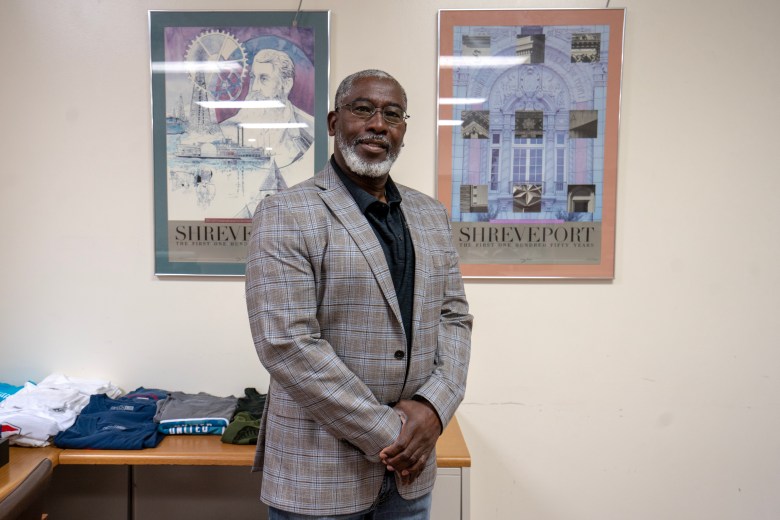
Lee A. Jeter Sr., the pastor of Good Hope Baptist in Bossier City, a predominantly African American church with 50 to 60 members, has a slightly different view. Jeter, who is also president of the Bossier Parish NAACP, told me that school prayer served a particularly important role for Black community members. Jeter had grown up in Bossier Parish on cotton plantations in housing provided by the owner. He had to walk to the local store because his family didn’t own a car, and sometimes people driving by threw stuff out their windows at him and his family, he recalled.
“As an African American, I thought when they took prayer out of the schools, it hurt the African American community more than anybody else,” Jeter told me, referring to Supreme Court decisions in the twentieth century banning prayer in schools. “That’s the only thing we had to hold on to. When all you see around you is hate, and you don’t see opportunities, you have to hold on to something.”
Today, about 70 percent of the area’s residents are white, about a quarter are Black, 7 percent are Hispanic, and 2 percent are Asian American, census data shows.
Still, Jeter said there should be limits. “We can’t force our faith, our denomination, whether it’s Baptist, Jewish, or Catholic, upon someone else,” he said. “It doesn’t mean we have to hide ours.”
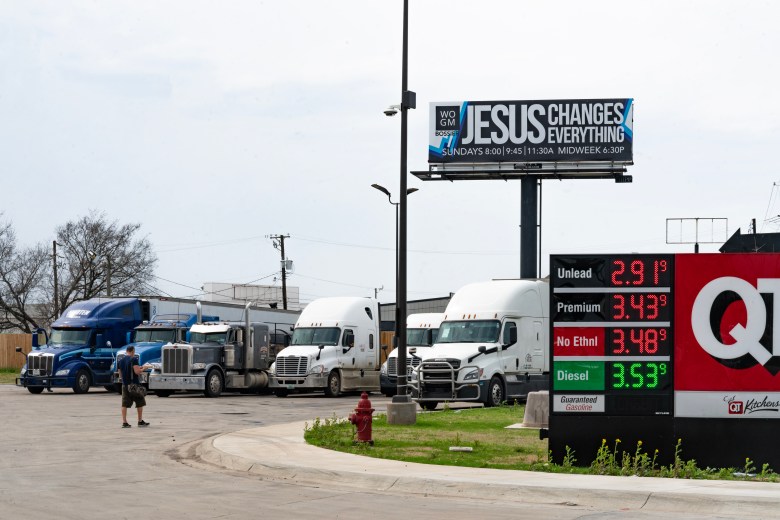
When I met with Jeb Baugh at a bubble tea café near the Air Force base, he told me he tries to remain optimistic that Bossier schools will change. Perhaps the training for teachers, he said, will gradually have an impact. “Maybe that makes some of them think twice before they spout off. Maybe it has made a difference.”
The teachers I interviewed gave a mixed report. Some principals at staff meetings discuss what teachers can and can’t say, they explained, while others ask teachers to watch the video on their own. One middle school teacher, who did not want her name used, said teachers can skip the video and just take a quiz on it. She did not know of any teacher at her school who had led children in prayer since the court order. But she also said that she recalled hearing, perhaps at a presentation for teachers, an administrator say that the school could escape scrutiny and maintain prayers at football games if the prayers were led by students picked through a random selection process, such as having their names put in a hat. “The consensus in Bossier Parish then and even now is, ‘We’re going to do whatever we want,’” she said.
Carrie Culpepper, a second-grade teacher at Bellaire Elementary School who has taught for 13 years, told me her principal made sure teachers understand what they can and can’t do. Teachers no longer have crosses in their classrooms, and Bible verses on their desk must face them, not the students. Teachers no longer pray alongside children at the start of the day, either. “We basically cannot share our religion. We can’t say, ‘Oh, you should go to church,’” she said.
“This isn’t a legal fight to some of these people. This is a religious war. This is a fight for the heart and soul of the country.”
Jeb Baugh, one of the plaintiffs in the case against Bossier Parish schools
Culpepper is Methodist, the daughter of a pastor, and the mother of five-year-old triplets. She supports the separation of church and state, and said she understands that not all her students may be Christian. “I don’t want to single out those kids,” she told me. “That’s not fair to them. They need to feel accepted. They don’t need to feel lesser.” But she also has empathy for those who fought to keep the prayers. “That’s the way they’ve grown up. They associate Christianity with morals. They’re trying to raise their kids right.”
After the court order, her school stopped its annual Christmas concert because it only observed one religion’s holiday, she told me. Teachers still put a Christmas tree in the lobby, but Culpepper said the school tries to make it inclusive. “Every teacher can put an ornament of whatever they want on there. So if they were Jewish, and they wanted to put a dreidel on there, they were more than welcome to,” she told me. When I pointed out that Christmas trees aren’t part of Judaism, she said, “I know, but if you wanted something to represent — and it’s not mandatory, of course.”
Russell’s daughter now attends Caddo Parish schools, the same system her mother attended. So far, her children are happy in their new schools, which are more diverse than their old ones in many ways, including religiously. Her daughter, now a seventh grader, said no teacher has tried to lead any of her classes in prayer, and no peer has belittled her beliefs. She’s on her middle school cheer team and recently won an award for reading the most books among the students over a nine-week period. “I’ve learned it doesn’t matter who you are, just be you,” she told me as a bell signaled the start of services at her Unitarian church. “You can have your opinion, and nobody cares.”
This story about prayer in schools was produced by The Hechinger Report, a nonprofit, independent news organization focused on inequality and innovation in education. Sign up for the Hechinger newsletter.




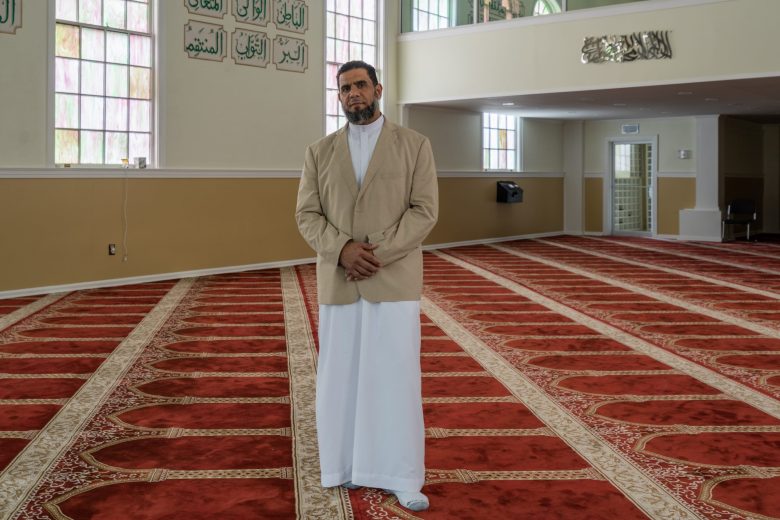
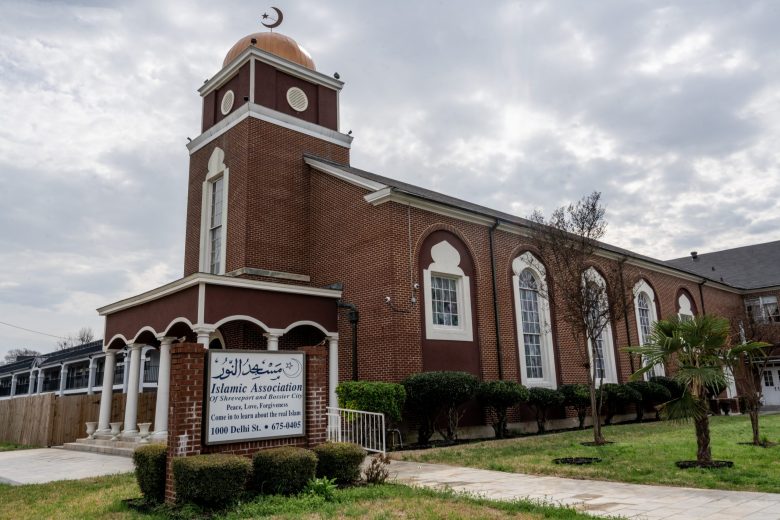
I pray that their campaign will fail!
If parents need prayer in school and other public places, perhaps they should look to failures within their own church and parenting skills as the reason for their children not being religious instead of trying to foist their beliefs on others.
The Constitution intended to prevent government institutions, such as schools, from forcing a particular belief onto others. There is nothing that prevents children from taking Bibles or other religious material to school and praying.
If parents and churches need others to take on that responsibility, then they are the ones that are shirkng their own responsibility. Forcing others to take up their failures is irresponsible in my opinion.
Unfortunately for the author the idea or term “separation of church and state” never appears in the constitution. It has no bearing at all in the constitution. The term was first used by Thomas Jefferson in a letter discussing the government establishing a state religion. It was only recently that the term was “discovered” in that letter and picked up and used in the courts. No matter what side of the argument you fall on you can’t say that the constitution calls for separation of church and state, simply not true. The constitution only states that the government can’t have an official religion that it forces people to follow.
Relationship, not religion.
God calls to each creature on this planet to fellowship with Him.
To keep our LORD out of public schools is to prohibit individuals the right and opportunity to have and benefit from a relationship with God.
This is a gross misuse of man’s God-given right to create and instate federal and local laws!